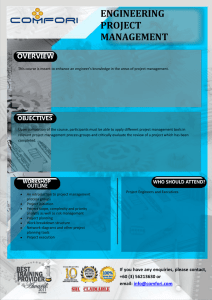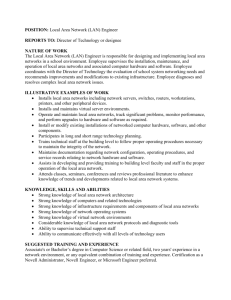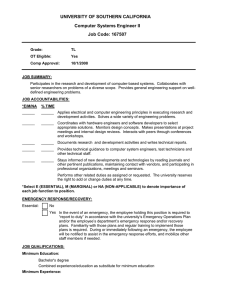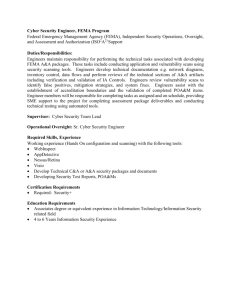Manager, Network Operations (LoP)
advertisement
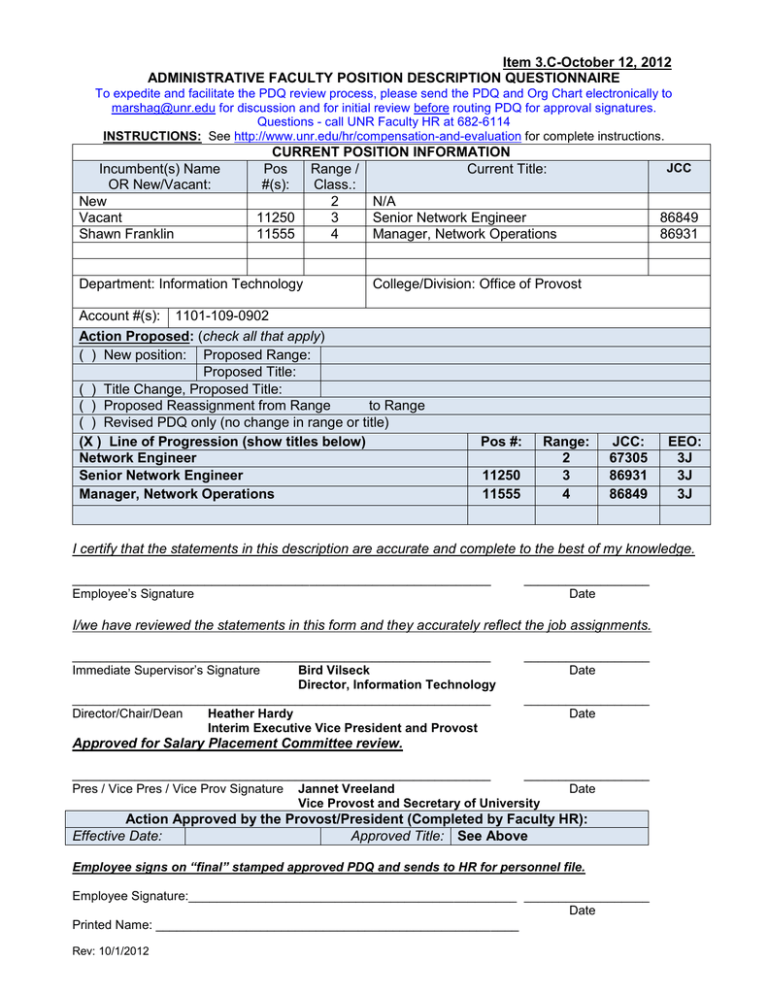
Item 3.C-October 12, 2012 ADMINISTRATIVE FACULTY POSITION DESCRIPTION QUESTIONNAIRE To expedite and facilitate the PDQ review process, please send the PDQ and Org Chart electronically to marshag@unr.edu for discussion and for initial review before routing PDQ for approval signatures. Questions - call UNR Faculty HR at 682-6114 INSTRUCTIONS: See http://www.unr.edu/hr/compensation-and-evaluation for complete instructions. Incumbent(s) Name OR New/Vacant: New Vacant Shawn Franklin CURRENT POSITION INFORMATION Pos Range / Current Title: #(s): Class.: 2 N/A 11250 3 Senior Network Engineer 11555 4 Manager, Network Operations Department: Information Technology JCC 86849 86931 College/Division: Office of Provost Account #(s): 1101-109-0902 Action Proposed: (check all that apply) ( ) New position: Proposed Range: Proposed Title: ( ) Title Change, Proposed Title: ( ) Proposed Reassignment from Range to Range ( ) Revised PDQ only (no change in range or title) (X ) Line of Progression (show titles below) Network Engineer Senior Network Engineer Manager, Network Operations Pos #: 11250 11555 Range: 2 3 4 JCC: 67305 86931 86849 EEO: 3J 3J 3J I certify that the statements in this description are accurate and complete to the best of my knowledge. ____________________________________________________________ Employee’s Signature __________________ Date I/we have reviewed the statements in this form and they accurately reflect the job assignments. ____________________________________________________________ Immediate Supervisor’s Signature Bird Vilseck Director, Information Technology ____________________________________________________________ Director/Chair/Dean Heather Hardy Interim Executive Vice President and Provost __________________ Date __________________ Date Approved for Salary Placement Committee review. ____________________________________________________________ __________________ Pres / Vice Pres / Vice Prov Signature Jannet Vreeland Date Vice Provost and Secretary of University Action Approved by the Provost/President (Completed by Faculty HR): Effective Date: Approved Title: See Above Employee signs on “final” stamped approved PDQ and sends to HR for personnel file. Employee Signature:_______________________________________________ __________________ Date Printed Name: ____________________________________________________ Rev: 10/1/2012 Position Description - Network Engineers – Line of Progression Page 2 1. Summary Statement: State the major function(s) of the position and its role in the university. Attach an organizational chart with positions, ranges, and names for the division which reflects the position in it as well as those supervised in the department. (This section is used for advertisement of the position.) The Network Engineer series of positions are responsible for analysis, design, implementation, maintenance and support of communications infrastructure for the University’s campuses and for the University of Nevada School of Medicine’s (UNSOM) statewide clinical operations, which includes wired and wireless networks facilitating data, voice, video, and other media transmission. The network infrastructure includes, but is not limited to routers, switches, access points, firewalls, and other network traffic engineering equipment as well as servers and software which provide core network services and functionality. The positions report to the Director, Information Technology through a hierarchy of positions as applicable. Range 2 – Network Engineer: The Network Engineer is responsible for maintenance of directory services, network operating systems, network security practices, and network problem troubleshooting. The position implements distributed applications, ensures network authentication, and assists with network security design and implementation. The individual installs and troubleshoots problems dealing with network communications hardware, ensures systems integration and optimization and provides supporting and monitoring services. The position ensures compliance with computer network communication protocols and maintains Virtual Local Area Networks (VLAN’s). Range 3 – Senior Network Engineer (in addition to above R2): The Senior Network Engineer works with the Network Security group and Network Architecture group to design, implement and maintain the network to meet all defined network requirements and other security-related requirements. The position is responsible for developing and maintaining "best practices" procedures and policies for use in the network operations group. The individual creates and implements network security design and systems integration. The position maintains Virtual Private Networks (VPN’s) and data communications equipment. The position monitors intrusion detection/prevention systems logs and data encryption of network. The position manages assigned projects and supervises work of graduate students. Range 4 – Manager, Network Operations (in addition to above R3): The Network Operations Manager provides high-level technical leadership, project oversight, administration, and strategic vision for the campus network. The individual serves on the Network Security group and Network Architecture group to design, implement and maintain the network to meet all defined network requirements and other security-related requirements. The position works with outside vendors for purchases, product updates, equipment exchange, information, best practices, and to facilitate equipment installations. The position manages and supervises the work of the network administrative and State Classified staff. 2. List the major responsibilities, including percentage of time devoted to each. Provide enough detail to enable a person outside the department to understand the job (percentage first with heading and then bulleted information). Range 2 – Network Engineer: 30% - Network Operations Administration Installs, tests and maintains network information systems defined above Updates network documentation to reflect changes Position Description - Network Engineers – Line of Progression Page 3 Assists departmental management with development of systems standards., Performs needs analysis and provides procurement support, installation, and problem resolution for local and wide-area networks Works with the Help Desk to resolve network related trouble calls that could not be resolved by the Help Desk, computer system administrators or network wiring technicians 25% - Network Analysis, Design, and Implementation Ensures proper security protocols are adhered to while performing job functions Provides configuration, operation, and administration of network hardware and communications links Works with departments, colleges and students on campus to evaluate needs 10% - Network Security Maintains and manages network security for local and wide area networks 35% - Network Evaluation and Troubleshooting Provides analyses of users’ needs and recommends appropriate network configurations to meet users needs and departmental standards Performs advanced diagnostics and maintenance on network devices when additional expertise is required with layer 1 and 2 network layers Performs preventative and fault isolation maintenance on the local and wide area networks with layer 3 and above network layers Range 3 – Senior Network Engineer (in addition to above R2): 40% - Network Operations Administration and Project Management Designs, configures, installs, and maintains switches, routers, firewalls and other network systems Reviews network and security logs for emerging problems and initiate preventive actions Deploys/implements/develops tools and utilities to aid in network monitoring and automation Provides project oversight for assigned projects 25% - Network Analysis, Design, and Implementation Designs and implements new communications systems Analyzes network infrastructure and traffic patterns; recommend changes for improvements Architects network systems including IP address, subnet, and VLAN Identifies new technologies which provide improved service or cost benefits to the university Analyzes, recommends, and presents findings on new infrastructure technologies and services to management and oversight groups Installs and maintains network operations services such as DNS, DHCP, Network Access Control, and others 25% - Network Security Implements network security policies as requested and approved Maintains campus firewalls and security systems Researches current security related issues that could have an impact on the campus communications Participates in network security audits Detects, contains and corrects network security breaches in collaboration with network security staff 10% - Network Evaluation and Troubleshooting Performs advanced diagnostics and maintenance on network devices when additional expertise is required with layer 3 and above network layers Position Description - Network Engineers – Line of Progression Page 4 Range 4 – Manager, Network Operations (in addition to above R3): 50% - Network Operations Administration and Project Management Develops network operational policies and procedures Provides oversight for all University and statewide network systems Manages IP Address and IP Subnet Allocation Implements network changes in response to security issues Collaborates on security management systems in locating security threats Provides project oversight for full range of network projects Establishes short- and long-term goals 25% - Network Analysis, Design, and Implementation Same as above 25% - Management Provides leadership and management of staff, facilities and services of the Network Operations group Hires, trains, develops, and evaluates faculty and staff Provides oversight for staff projects and day-to-day supervision of network operations Monitors and assesses quality of service for continuous improvement Keeps management informed on issues/problems and their resolutions Provides strategic direction for unit 3. Describe the level of freedom to take action and make decisions with or without supervision and how the results of the work performed impact the department, division and/or the university as a whole. Level of Freedom: Range 2: The Network Engineer works with independent discretion to diagnose and resolve outages and problems with basic trouble shooting skills and makes recommendations to user and supervisor on equipment and costs. The individual’s judgment exercised does not typically extend beyond established precedent without consultation with peers or supervisor, i.e., decisions regarding new technology or equipment needs. The position consults with supervisor on more complex trouble shooting issues and is advised on unresolved issues. Range 3: The Senior Network Engineer determines the design, implementation, and maintenance of the campus communications infrastructure and for the daily operations of the network security systems. The position evaluates, supervises and maintains quality control of projects and ongoing operations. The position may make variations in guidelines or processes but reports to the supervisor. The position performs functions on a university-wide and statewide basis and handles majority of situations without assistance. The position consults with supervisor on most complex issues and situations that include multiple stakeholders. The Senior Network Engineer may monitor work of staff, graduate students, and/or LOA workers. Range 4: The Network Operations Manager has full responsibility to manage day-to-day operations of the department. In consultation with the Director of Information Technology, the incumbent has primary responsibility for decisions related to network upgrades and installations and makes recommendations for significant purchases of network equipment and selection of vendors. The position develops and promulgates network policies in consultation with Network Security Manager, network oversight groups and other IT managers. The position manages and develops the unit’s Position Description - Network Engineers – Line of Progression Page 5 budget and administrative procedures. The position has the authority to deviate from established practice in area of expertise/responsibility and is held accountable for results. The Manager supervises work of staff, graduate students, and/or LOA workers. The position consults with supervisor on complex issues. Impact: Critical to all departments, colleges, and students of the University, the network infrastructure must be reliable, efficient, and secure. Failure to think clearly, make good decisions, and perform well, often in high-pressure situations, may result in network failures, viruses, or computer security breaches. These incidents may result in loss of data, compromise security of personal and financial data, and impact university-wide productivity. Extended unscheduled outages of the network infrastructure negatively impact research, administrative functions, classroom, and student activities. Federal and industry regulations (Family Educational Rights and Privacy Act (FERPA), Health Insurance Portability and Accountability Act (HIPPA), Procurement Card Industry (PCI), etc.) must be adhered to in all applicable networks. Failure to comply could result in fines, citations and/or shutdown of network services. Range 2: Inadequate performance may result in delays or inefficiencies in the administration of university programs. Failures result in loss of service and functionality within the University and University of Nevada Medical School (UNSOM) clinical operations. Range 3: Inadequate performance has a detrimental effect on the achievement of objectives related to major university goals. Poor decision-making and resource management are costly to the institution. Failures result in loss of service and functionality within the University and UNSOM clinical operations. Range 4: The position is responsible for the efficient, reliable, and secure operation of the campus network infrastructure which is critical to the daily needs of every department of the university and all students. Timely and correct decisions are essential in maintaining network communications within the university and with others outside the university. The network is a significant university investment. Poor decision-making and resource management are costly to the institution. The position provides leadership in the performance of the position in order to insure the success and credibility of the unit’s work and the reputation of the University. 4. Describe the knowledge, skills (to include cognitive requirement and verbal and written communication), and abilities (to include task complexity, problem solving, creativity and innovation) essential to successful performance of this job (in bullet format). Knowledge of: Range 2: Principles, practices, and techniques used to configure, install, maintain, operate, and administrate network systems and communications links Network operating systems and problem troubleshooting to include cabling and network equipment and components (routers, switches, access points, etc.) Principles, practices, and techniques used to install, maintain, and support Local Area Networks (LAN) and Wide Area Networks (WAN) Network/Routing protocols including TCP/IP, DNS, DHCP Network planning, analysis, and best practices Directory services Position Description - Network Engineers – Line of Progression Page 6 Computer software and hardware to include concepts, characteristics, and capabilities of network based applications Productivity tools Current and emerging trends in developing computer networking technology Data communications Vendor evaluations Network Security VoIP and Telephony Range 3 (plus Range 2 above): Network/Routing protocols including TCP/IP, DNS, DHCP, OSPF, BGP, VRRP, etc. Firewall access control theory and VPN technologies Intrusion detection systems Log aggregation and analysis systems Methodology for implementing distributed applications, network authentication, and data storage networks Network security design and implementation Systems integration, hardware and data communications Support of remote access Virtual Private Networks (VPN’s) and Virtual Local Area Networks (VLAN’s) Computer network communication protocols Network performance trending and network utilization Data processing systems Network design and architecture Project management Directory services integration Intrusion detection/prevention systems logs and data encryption methodologies Range 4 (plus Range 3 above): Network management systems Policies and procedures of supervision Procurement procedures Inventory procedures Budgeting procedures Skills: Range 2: Effective verbal and written communication Commitment to customer satisfaction Interpersonal and human relations skills Analytical, decision-making, and problem-solving skills Proficiency in use of a personal computer and current software applications including but not limited to Microsoft Office Suite (Word, Access, Excel, PowerPoint, and email) System administration skills for Unix/Windows operating systems, and Windows Desktop OS Proficiency in analytical thinking and problem solving State and Federal laws and regulations concerning Federal Educational Rights and Privacy Act (FERPA) and HIPAA Range 3 (plus Range 2 above): Evaluation, testing, and analysis of existing and future technologies and equipment Training staff in a specialty or functional area with technical elements Network design, implementation and monitoring Position Description - Network Engineers – Line of Progression Page 7 Network security design, implementation and monitoring Project management Range 4 (plus Range 3 above): Federal Communication Commission (FCC) regulations and compliance Supervisory skills, including an ability to teach and mentor staff and to achieve both results and client satisfaction Budget management Purchasing rules, regulations, procedures, and policies and their interpretation Leadership Ability to: Range 2: Understand and interpret formalized policies, guidelines, rules, and regulations and security technical manuals Work as a collaborative team member Implement minor network changes or additions to switches and access points Communicate basic technical concepts and terminology to agency management and network users Demonstrate and establish working relationships with diverse groups of clients, colleagues, and partners Learn new technologies Act quickly to resolve critical issues and solve network problems Prioritize assigned projects/tasks in an efficient and timely manner Collect and analyze data and write performance and utilization reports Implement network changes Communicate complex technical concepts and terminology to management and network users Recommend hardware to solve network issues Configure and deploy switches and basic routers Verify router configuration Verify network capacity and provide utilization statistics Range 3 (plus Range 2 above): Understand complex technical manuals Assess requirements and evaluate solutions to best fit the goals of the organization and overall strategic plans Ensure cost-effective and efficient use of network technologies and resources Manage, prioritize, and complete multiple projects/tasks in an efficient and timely manner Design access control lists for routers and switches Design, configure and deploy firewalls, routers, and switches Design and implement network architecture Present network design recommendations to management Implement network design changes Provide technical training, direction, and leadership Design and configure virtual private networks Interpret authentication logs Use network protocol analyzer to analyze network packets Keep projects on schedule and budget Keep management informed on issues/problems Range 4 (plus Range 3 above): Supervise and motivate, empower, and lead staff Work effectively with people with diverse technical backgrounds Position Description - Network Engineers – Line of Progression Page 8 Be sensitive to disabilities and cultural and ethnic diversity issues Work with vendors to plan, evaluate, and facilitate installation of new products and technologies Respect user privacy, information security, and protection of evidence Stay current in discipline by seeking out and learning new information pertinent to performance of duties Act as authority in area of expertise 5. Describe the type of personal contacts encountered in performing the duties of the job. Explain the nature and purpose of these contacts: i.e., to provide services, to resolve problems, to negotiate. Internal Range 2: Technical and non-technical staff University faculty and staff IT Colleagues Students Range 3, plus R2 above: IT Colleagues Range 4, plus R3 above: IT colleagues and management University faculty and staff University administration, Facilities and other departmental leadership External Range 2, plus R1 above: Vendors and other commercial agents Reason for Contact To resolve network issues, security issues, and to perform the evaluation and installation of new services To stay informed of on-going and future projects that may require network communications or security To determine hardware and security needs and system requirements, resolve problems, share information To resolve network issues, security issues, and to perform the evaluation and installation of new services To determine and advise on hardware and security needs and system requirements, resolve problems, share information To plan, problem solve, coordinate projects, develop policy, and share information To evaluate new services, resolve network problems, resolve security incidents, provide advice on network related issues and keep others informed on network operational issues To share information about on-going and future projects that may require cabling and/or other network services; assess costs Reason for Contact To evaluate and purchase equipment, receive product updates, conduct equipment exchange, resolve problems, obtain information exchange and best practices Range 3, plus R2 above: Same as above Range 4, plus R3 above: Vendors and Contractors Same as above plus to negotiate and secure services Position Description - Network Engineers – Line of Progression Page 9 6. Indicate the minimum qualifications which are necessary in filling this position should it become vacant. Please keep in mind the duties/responsibilities of the position rather than the qualifications of the incumbent. a. Minimum educational level, including appropriate field, if any. Range 2, 3, 4: Bachelor’s Degree from a regionally accredited institution b. Minimum type and amount of work experience, in addition to the above required education necessary for a person entering this position. Range 2: Bachelor’s Degree and two years of experience in network operations and/or system administration Preferred Licenses or Certifications: Cisco Certified Network Associate (CCNA) or equivalent Range 3: Bachelor’s Degree and four years, or Master’s Degree and two years, of experience in network operations in a network operations environment, including TCP/IP, router and switch management and administration Preferred Licenses or Certifications: CCNA, Cisco Certified Internetwork Expert (CCIE), or equivalent Range 4: Bachelor’s Degree and five years, or Master’s Degree and three years, of experience in a network operations environment and UNIX administration to include supervisory experience in the computer or networking field Preferred Licenses or Certifications: CCNP, CCIE, or equivalent c. Indicate any license or certificate required for this position. None
